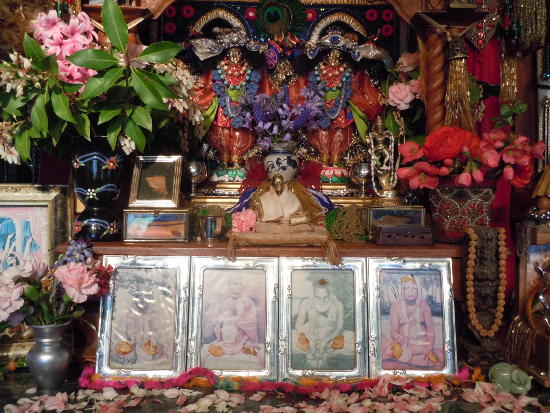
Dec 12 1976--
Prabhupāda: They'll come gradually, not immediately. Immediately, the psychology is, they have got attachment for their house. It may be worse house, but still, their attachment... That is natural. Long, long ago, when I was child practically, I went with my father in the village. So one man from the village was serving us. So my father: "This boy is nice. So why not take him to Calcutta?" So one day he was absent. It was dropping and... So I went in the interior of the village and I saw that his house was broken, there was no roof, and rain was falling and he was sitting, covering with a cloth. Then I told him that "Why not come with us in Calcutta? We shall give you nice place, nice food." So his answer was, nā bābu kanceri jabo nā (?): "Bābujī, I cannot go out of my home." That was his home. (laughter)
This is my practical exp... He was sitting idly and it dropping and he could not come to serve. Still, that is his home, and he cannot leave home, that "Bābu kanceri jabo nā (?). That is psychology. It may be very worse condition; still, nobody wants to give up "home sweet home." That is natural psychology. So you have to manage. You see then why they, these Delhi passenger clerks... This morning I was telling that son was asking mother, "Who is this man?" His father, and he had never seen. "You have seen father." No, rather, he had no chance to see father because when the father comes back from the office it is night, ten o'clock or more than that. That time the son is sleeping, and again he has to go early in the morning. That time also, son is sleeping. So he did not know. So one Sunday, when he's grown up, he is asking his mother, "Who is this man?" "So this man..."
Not only in India, in everywhere. I have seen in New York from the other island? What is that?
Haṁsadūta: Long Island.
Prabhupāda: Long Island. They are coming two hours in the ferry, three hours in the bus. They are going to the office. Eight hours there. Then five hours and eight hours, thirteen hours, again five hours. Then thirteen and..., eighteen hours. And for six hours they have got home. "Home sweet home."
Mahāṁśa: I knew people coming from Poona to Bombay to work.
Prabhupāda: Just see.
Mahāṁśa: All the way from Poona.
Prabhupāda: The home attachment is so great. These Delhi passengers, they are coming, hanging, and there are so many accidents daily. And few hours he will live with wife. That is his home. And whole other, out of twenty-four hours, seventeen hours are outside, and maybe seven hours at home. But still, he'll come home. The home attachment is very big. Therefore we have to create attachment for this hari-saṅkīrtana. If you create that attachment, then they will give up home attachment, try life, to live here. Athāsaktiḥ. You have to train them in Kṛṣṇa consciousness in such a way.
EK 5...
Without looking to Kṛṣṇa’s lotus feet, all religious, social or political endeavors will fail. It is not possible to make progress as long as our desires are anchored in the material world. In this regard, there is a story of a bridegroom’s party who had to go to the bride’s house down the river. It was settled that they would start at night by boat and reach the destination early in the morning. Therefore at night, after supper, the jubilant party got aboard a boat, made themselves comfortable and instructed the boatmen to start. Since all the members of the party were seated comfortably, and since the river breeze was very pleasant, they slept soundly that night. In the morning they all got up early, but to their astonishment they saw that the boat had not moved an inch toward the destination, even though the boatmen had rowed vigorously all night long. Finally, after inquiring, they found that despite the boatmen’s rowing, the boat had not moved because they had failed to raise the anchor. The marriage ceremony was thus spoiled because of a foolish mistake.
Our present civilization is therefore a mistaken civilization because the mistaken leaders have forgotten to raise the anchor of attachment. Instead, the anchor is being more and more firmly fixed because they have structured the social order on the basis of sense gratification.
Compiled by Damaghosa dasa

